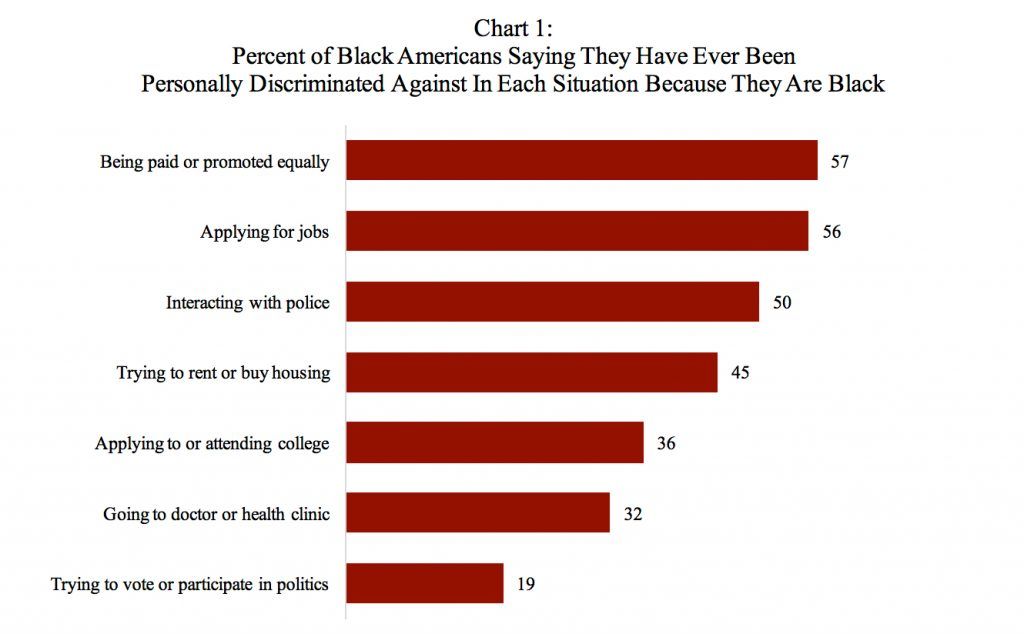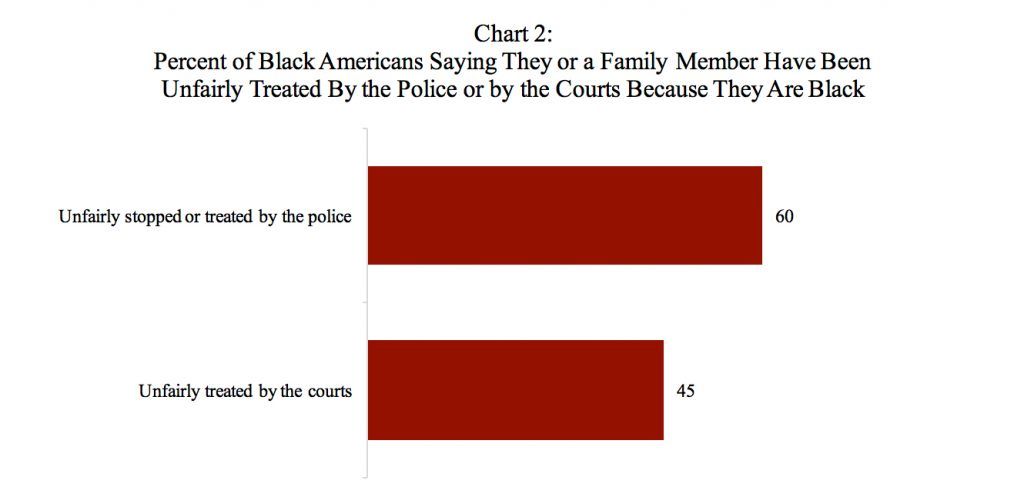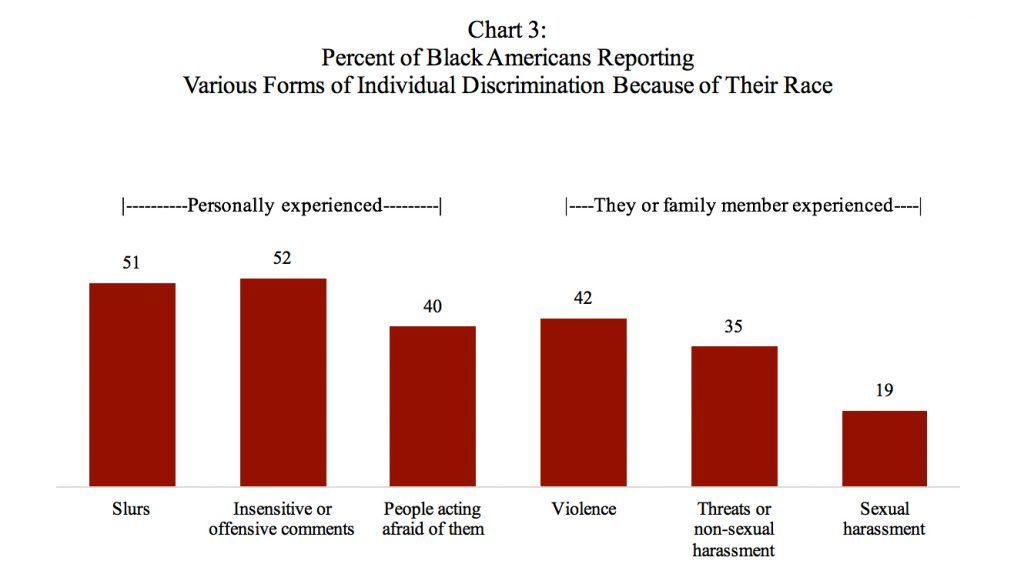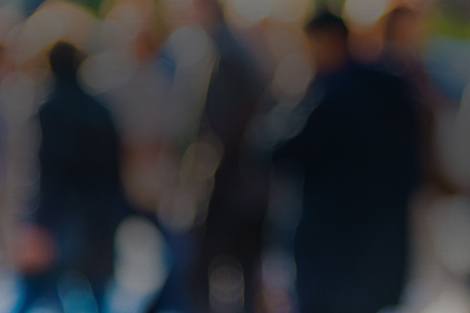For immediate release: October 24, 2017
Boston, MA – This report is part of a series titled “Discrimination in America.” The series is based on a survey conducted for National Public Radio, the Robert Wood Johnson Foundation, and Harvard T.H. Chan School of Public Health. While many surveys have explored Americans’ beliefs about discrimination, this survey asks people about their own personal experiences with discrimination.
Half or more of Black Americans report being personally discriminated against in the workplace and when interacting with police
In the context of institutional forms of discrimination, half or more of Black Americans report being personally discriminated against because they are Black when it comes to being paid equally or considered for promotion (57%), when applying for jobs (56%), or when interacting with police (50%) (Chart 1).

“What is portrayed in the daily news about racial discrimination in America corresponds to the very real personal experiences of Black Americans today, particularly in the areas of employment, interacting with the police, and housing,” says Robert Blendon, Richard L. Menschel Professor of Health Policy and Political Analysis at Harvard T.H. Chan School of Public Health, who co-directed the survey.
In a separate question, 60% of Black Americans say that they or a family member have been unfairly stopped or treated by the police because they are Black, and 45% say they or a family member have been treated unfairly by the courts because they are Black (Chart 2).

Half of Black Americans have experienced racial slurs and negative comments; Roughly four in ten have experienced violence and threats or harassment
In the context of individual or interpersonal forms of discrimination, at least half of Black Americans say they have personally experienced people using racial slurs against them (51%) or making insensitive or offensive comments about their race or ethnicity (52%) (Chart 3).

Additionally, roughly four in ten Black Americans say they have experienced people acting afraid of them (40%) because of their race, and further that they or a family member have experienced violence (42%) or threats or non-sexual harassment (35%) because they are Black (Chart 3).
Harvard professor David Williams on health consequences of discrimination
David Williams, PhD, MPH, the Florence Sprague Norman and Laura Smart Norman Professor of Public Health at the Harvard T.H. Chan School of Public Health and Professor of African and African American Studies and Sociology at Harvard University, says that it’s well documented that Black Americans generally have poorer health and die sooner than whites in America. The effects of experiencing discrimination, in both institutional and individual contexts, can accumulate over time and trigger an array of health problems, including elevated blood pressure, heart disease, and even premature aging or mortality, among others. Williams says, “This poll helps us see where we need to take action to address the problem.”
A third of Black Americans have been personally discriminated against when seeking healthcare
The poll also found that in the context of healthcare, roughly one third (32%) of Black Americans say they have been personally discriminated against because they are Black when going to a doctor or health clinic (Chart 1).
Additionally, 22% of Black Americans say they have avoided seeking medical care for themselves or a member of their family out of concern they would be discriminated against because they are Black.
Black Americans see individual prejudice as a larger problem than laws and governmental policies
Overall, 92% of Black Americans said they believe that discrimination against Black people exists in America today. Among those, nearly half (49%) say that discrimination based on individuals’ prejudice is the larger problem, while 25% say discrimination based in laws and government policies is the larger problem. Another 25% say both forms of discrimination are equally a problem.
(Watch on-demand video of an NPR/RWJF/Harvard Chan webcast focusing on the poll. A multi-part series will also air on NPR starting Oct. 24.)
Survey Background
The survey was conducted January 26–April 9, 2017, among a nationally representative, probability-based telephone (cell and landline) sample of 3,453 adults age 18 or older. The survey included nationally representative samples of African Americans, Latinos, Asian Americans, Native Americans, as well as white Americans; men and women, and LGBTQ adults. This report presents the results specifically for a nationally representative probability sample of 802 African-American U.S. adults. Future reports will analyze each other group, and the final report will discuss major highlights from the series.
For more information:
Todd Datz
617.432.8413
tdatz@hsph.harvard.edu
Visit the Harvard Chan School website for the latest news, press releases, and multimedia offerings.
###
Harvard T.H. Chan School of Public Health brings together dedicated experts from many disciplines to educate new generations of global health leaders and produce powerful ideas that improve the lives and health of people everywhere. As a community of leading scientists, educators, and students, we work together to take innovative ideas from the laboratory to people’s lives—not only making scientific breakthroughs, but also working to change individual behaviors, public policies, and health care practices. Each year, more than 400 faculty members at Harvard Chan School teach 1,000-plus full-time students from around the world and train thousands more through online and executive education courses. Founded in 1913 as the Harvard-MIT School of Health Officers, the School is recognized as America’s oldest professional training program in public health.
